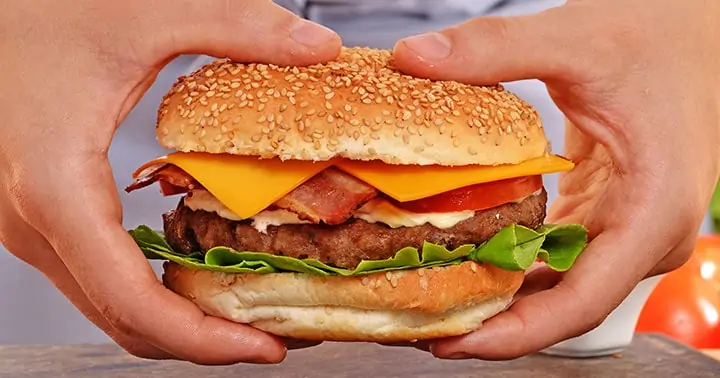You can barely travel a mile in an American city or suburb without passing at least one fast food joint. While that certainly is convenient, and there’s nothing wrong with indulging every once in a while, eating fast food regularly and a poor diet in general are associated with a host of health problems. The most prevalent among them is hormone imbalance and obesity. These two often go hand in hand, because hormones affect how your body uses calories (and, thus gains or loses weight), while adipose (fatty) tissues secrete hormones of their own, which often cause your body to put on even more weight.
What Makes Fast Food and an Unhealthy Diet So Bad?
Proper nutrition encompasses many different factors. Your body needs nutrients like vitamins, minerals, healthy fats, and dietary fiber to work properly. In order to power all your body’s functions, your body also needs calories. Hormones react to your diet, and cue your body to either store or use consumed nutrients and calories.
Some foods like most vegetables and beans are high in essential nutrients, but low in calories; meaning they’re nutrient-dense and calorie poor. These should form the bulk of what you eat. Other foods are both nutrient and calorie-dense, such as meat, nuts, and fruits. It’s perfectly healthy to eat these regularly, as long as you do so in moderation.
Other foods, though, are nutrient-poor and calorie-dense. This category includes unhealthy foods such as candy, oils, and processed food products such as chips, cookies and other snacks. Undoubtedly, the most regularly-consumed item in the nutrient-poor-but-calorie-dense category is fast food. Fast food undergoes considerable processing to allow its ingredients to stand up to long-haul shipping, freezing, and high-temperature cooking methods like super-hot griddles and frying oil.
Regularly consuming fast food and an unhealthy diet full of processed foods means your body is absorbing a high number of calories while receiving very little nutritional benefit from it. This results in extra pounds being packed onto your body and, often, a hormonal imbalance that compounds the weight gain.
Hormones Associated with Weight Gain
Body fat is heavily influenced by and, in turn, influences a number of different hormones, but the most important among them are insulin, cortisol, estrogen, and testosterone. All these hormones exist in balance with each other when your body is at a healthy weight, but hormone imbalance is directly tied to excess weight gain.
Insulin: The Messenger
Your pancreas releases insulin when your blood glucose levels increase, which occurs after you eat – especially easy-to-digest foods like sugars and simple carbs like burger buns or flour tortillas. Insulin signals your cells to allow sugar to pass from your blood into your cells, providing them with energy. Sugar which isn’t used by your cells will eventually be stored as fat. However, having elevated insulin levels can often lead to a pre-diabetic condition called insulin resistance, where your cells need more and more insulin before they open themselves up to blood sugar. This means that more and more sugar will end up stored as fat in your body.
Estrogen: The Fat-Storage Hormone
Estrogen produced naturally by your body is called endogenous estrogen. It plays many different roles, but one of its functions is retaining fat. This was useful in caveman days when calories were hard to come by, but these days, not so much. While a certain amount of endogenous estrogen is necessary, high body fat means your body produces even more estrogen, which in turn makes your body more apt to retain fat – a vicious cycle. Exogenous estrogen, the kind that you consume in food and drink, complicates the issue further because your body has no built-in defenses against it.
Cortisol: The King of Stress
When you feel stress, your body releases cortisol. At slightly-above-normal levels, the kind of levels you would achieve through exercise or eating less calories than you use, cortisol can actually help you lose weight because it stimulates gluconeogenesis, the process by which your body turns fat into glucose that your cells can actually use. It also regulates your appetite – the more cortisol in your system, the bigger your appetite. However, having elevated cortisol levels for too long switches its function and it will actually start to inhibit gluconeogenesis but still increase your appetite—leading to the perfect storm of potential weight gain.
Testosterone: The Workhorse
Testosterone itself doesn’t directly affect your weight, but excess body fat significantly lowers your testosterone. What’s so insidious about this is that testosterone makes you feel energetic and motivated, and it also affects your bone density and memory. Low testosterone makes you feel sluggish, forgetful, and can even lead to depression, especially when coupled with elevated cortisol. When hormone imbalance reduces your testosterone levels significantly, it is more difficult to find the motivation and energy to lose weight.
Reversing Hormone Imbalance
Whether it is caused by consuming too much fast food or other factors, gaining weight changes your body’s hormone levels and your hormone levels influence your weight. Left uncontrolled, a hormone imbalance can quickly become a self-reinforcing problem.
Fortunately, reversing a hormone imbalance is possible. Improving your diet and exercising regularly help greatly. Hormone replacement therapy can also help your body achieve an optimal hormone balance and do so more quickly than exercising and diet improvements alone.
 East Delray, Florida
East Delray, Florida West Delray, Florida
West Delray, Florida The Boca Raton, Florida
The Boca Raton, Florida Midtown Miami, Florida
Midtown Miami, Florida Carillon Wellness Resort
Carillon Wellness Resort  Williams Island
Williams Island  Midtown Tampa, Florida
Midtown Tampa, Florida Life Time
Life Time Grand Wailea
Grand Wailea  NOW OPEN
NOW OPEN  COMING SOON
COMING SOON 
